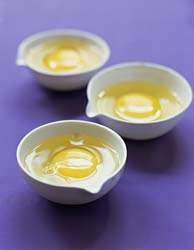CNBC ran a feature about raw eggs in recipes today that contained some food safety nose-stretchers.
.jpg) On the plus side, the story acknowledged that raw eggs can carry salmonella, and when Catherine Donnelly, a professor of food safety at the University of Vermont, said that adults may get sick from salmonella, but are unlikely to die, the story said,
On the plus side, the story acknowledged that raw eggs can carry salmonella, and when Catherine Donnelly, a professor of food safety at the University of Vermont, said that adults may get sick from salmonella, but are unlikely to die, the story said,
“not dying is a pretty low bar to set for dinner.”
Charles Reeves, chef and owner of Penny Cluse Cafe, a restaurant in Burlington, Vt., known for its from-scratch breakfasts and lunches, said,
"You can’t own a restaurant and call yourself a chef if you’re using mayonnaise out of a bottle. It’s just too easy to make it better yourself."
Though his customers’ safety is a primary concern, Reeves doesn’t think twice about using raw eggs, including serving them over easy and sunny side up.
"You just always have to use absolutely fresh eggs that come from a reputable source," he says.
A reputable source with those superhero Salmonella goggles?
Todd Pritchard, a food scientist at the University of Vermont, said farm fresh doesn’t necessarily mean bacteria free, adding,
"Bacteria are blind. They don’t see whether the eggs come from a local farmer or are free-range or organic."
 That’s of no concern to Nancy Oakes, a James Beard award-winning chef and owner of San Francisco’s Boulevard Restaurant who calls the raw egg a "simply magical food."
That’s of no concern to Nancy Oakes, a James Beard award-winning chef and owner of San Francisco’s Boulevard Restaurant who calls the raw egg a "simply magical food."
At Boulevard, Oakes creates aiolis with raw egg yolk, and accompanies her Caesar salad with a soft-cooked egg on the side. She says safety efforts focus too much on the kitchen, and not enough on the farms where the eggs are produced.
The story concludes that for adult home cooks in good health, the minute risk of being sickened may be worth the joy of soft boiled eggs or homemade mayo. Ditto when dining out.
That’s not true.
The American Egg Board estimates the risk of an egg being contaminated with salmonella at about 1 in 20,000. So at home, if I make mayo, or dip into the pancake batter, I’ve upped the risk to 5-6 out of 20,000. If a restaurant is making mayo or aioli, dozens if not hundreds of eggs could be used, cross-contaminating the kitchen area and potentially sickening thousands of people daily.
Risk gets amplified real easily.
Pritchard also points out that while it’s true that the likelihood of being sickened by an egg is low, it doesn’t matter, if you’re the one who gets sick.
Especially if it is preventable.
